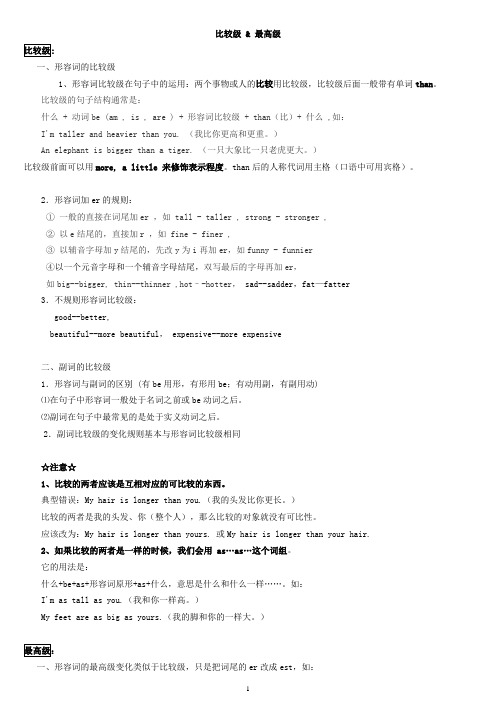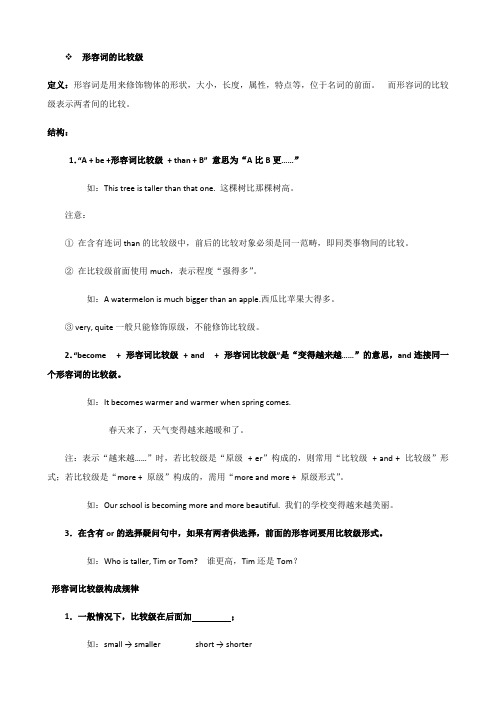小学英语比较级课件
小学英语必背比较级和最高级

小学英语必背比较级和最高级-CAL-FENGHAI.-(YICAI)-Company One1比较级和最高级1.在形容词词尾加上“er”“est”构成比较级、最高级:bright(明亮的)—brighter—brightestbroad(广阔的)—broader—broadestcheap(便宜的)—cheaper—cheapestclean(干净的)—cleaner—cleanestclever(聪明的)—cleverer—cleverestcold(寒冷的)—colder—coldestcool(凉的)—cooler—coolestdark(黑暗的)—darker—darkestdear(贵的)—dearer—dearestdeep(深的)—deeper—deepestfast(迅速的)—faster—fastestfew(少的)—fewer—fewestgreat(伟大的)—greater—greatesthard(困难的,硬的)—harder—hardesthigh(高的)—higher—highestkind(善良的)—kinder—kindestlight(轻的)—lighter—lightestlong(长的)—longer—longestloud(响亮的)—louder—loudestlow(低的)—lower—lowestnear(近的)—nearer—nearestnew(新的)—newer—newestpoor(穷的)—poorer—poorestquick(快的)—quicker—quickestquiet(安静的)—quieter—quietestrich(富裕的)—richer—richestshort(短的)—shorter—shortestslow(慢的)—slower—slowestsmall(小的)—smaller—smallestsmart(聪明的)—smarter—smartestsoft(柔软的)—softer—softeststrong(强壮的)—stronger—strongestsweet(甜的)—sweeter—sweetesttall(高的)-taller-tallestthick(厚的)—thicker—thickestwarm(温暖的)—warmer—warmestweak(弱的)—weaker—weakestyoung(年轻的)—younger—youngest2.双写最后一个字母,再加上“er”“est”构成比较级、最高级:big(大的)—bigger—biggestfat(胖的)—fatter—fattesthot(热的)—hotter—hottestred(红的)—redder—reddestsad(伤心的)—sadder—saddestthin(瘦的)—thinner—thinnestwet(湿的)—wetter—wettestmad(疯的)—madder—maddest3.以不发音的字母e结尾的形容词,加上“r”“st”构成比较级、最高级:able(能干的)—abler—ablestbrave(勇敢的)—braver—bravestclose(接近的)—closer—closestfine(好的,完美的)—finer—finestlarge(巨大的)—larger—largestlate(迟的)—later—latestnice(好的)—nicer—nicestripe(成熟的)—riper—ripestrude(粗鲁的)—ruder—rudestsafe(安全的)—safer—safeststrange(奇怪的)—stranger—strangestwide(宽广的)—wider—widest wise(睿智的,聪明的)—wiser—wisest white(白的)—whiter—whitest4.以字母y结尾的形容词,把y改为i,再加上“er”“est”构成比较级、最高级:busy(忙碌的)—busier—busiestdirty(脏的)—dirtier—dirtiestdry(干燥的)—drier—driestearly(早的)—earlier—earliesteasy(容易的)—easier—easiestfriendly(友好的)—friendlier—friendliestfun—funnier—funniesthappy(开心的)—happier—happiesthealthy(健康的)—healthier—healthiestheavy(重的)—heavier—heaviesthungry(饿的)—hungrier—hungriestlazy(懒惰的)—lazier—laziestlucky(幸运的)—luckier—luckiestnaughty(调皮的)—naughtier—naughtiestnoisy(嘈杂的)—noisier—noisiestpretty(美丽的)—prettier—prettiestsilly(傻的)—sillier—silliestspicy(辣的)—spicier—spiciestthirsty(渴的)—thirstier—thirstiestugly(丑的)—uglier—ugliest5.双音节、多音节形容词,在单词前面加上“more”“most”构成比较级、最高级:afraid(害怕的)—more afraid—most afraidbeautiful(美丽的)—more beautiful—most beautifulcareful(仔细的)—more careful—most carefulcheerful(开心的)—more cheerful—most cheerfulcrowded(拥挤的)—more crowded—most crowdeddangerous(危险的)—more dangerous—most dangerousdelicious(美味的)—more delicious—most deliciousdifficult(困难的)—more difficult—most difficultexciting(令人兴奋的)—more exciting—most excitingexpensive(昂贵的)—more expensive—most expensivefamous(著名的)—more famous—most famoushard-working(勤奋的)—more hard-working—most hard-working helpful(有帮助的)—more helpful—most helpfulhonest(诚实的)—more honest—most honestimportant(重要的)—more important—most importantinteresting(有趣的)—more interesting—most interestingpolite(有礼貌的)—more polite—most politeterrible(可怕的)—more terrible—most terribletired(累的)—more tired—most tired6.不规则变化的形容词:bad(坏的)—worse—worstfar(远的)—farther—farthest (far—further—furthest)good(形容词好的)—better—bestwell(副词好的,身体好的)—better—bestill(病的)—worse—worstlittle(少的)—less—leastmany(形容可数多的)—more—mostmuch(形容不可数多的)—more—mostold(年老的)—older—oldest ( old—elder—eldest)。
小学英语比较级

一、形容词、副词的比较级和最高级的构成规则1.大多数单词的变法small→smaller→smallest short→shorter→shortest great→greater→greatest clever→cleverer→cleverest narrow→narrower→narrowest tall→taller→tall est2.以不发音e结尾的单音节词,比较在原级后加-r,最高级在原级后加-st;large→larger→largest nice→nicer→nicest3.先双写末尾的辅音字母,比较级加-er,最高级加-est;big→bigger→biggest hot→hotter→hottest fat→fatter→fattest thin-thinner-thinnest new--newer/newest sad-sadder--saddest red--redder--reddest4.以“辅音字母+y”结尾的双音节词,把y改为i,比较级加-er,最高级加-est;easy→easier→easiest heavy→heavier→heavies t busy→busier→busiest happy→happier→happiest5.其他双音节词和多音节词,比较级在前面加more,最高级在前面加most;beautiful→more beautiful→most beautifuldifferent→more different→most different注意:(1)形容词最高级前通常必须用定冠词the,副词最高级前可不用。
6.有少数形容词、副词的比较级和最高级是不规则的,必须熟记。
good-----better------best 好的well------better------best 身体好的bad------worse------worst 坏的ill--------worse-------worst 病的many--------more------most 许多much------more--------most 许多few------less-------least 少数几个little-------less------least 少数一点儿far------further------furthest 更进一步,程度far------farther------farthest 更远,路程old-------older------oldest 年老的(指年纪)old------elder-------eldest 年老的(指兄弟姐妹的排行)二、形容词、副词的比较级和最高级的用法1.“A + be +形容词比较级+ than + B” 意思为“A比B更……”。
小学六年级英语语法总复习PPT课件

• 小学阶段不规则动词全表
• Infinitive Past tense Infinitive
• 1. am, is
was
2. keep
• 3.are
were
5. make made
4.become
7. blow
blew
8. read
• 9. buy
bought
10. ride
• 11. catch caught
fly-flying walk-walking
jump-jumping sleep-sleeping
climb-climbing fight-fighting
swing-swinging drink-drinking catch-catching pick-picking
watch-watching play-playing
dance danced
变y为 i+ed
study studied
动词的过去式(不规则)
go-went read-read eat-ate sing-sang take-took buy-bought see-saw swim-swam am,is-was do-did are-were have-had get-got leave-left fly-flew stop-stopped(双写)
.
• 一般现在时的变化
1. be动词的变化。
否定句:主语+ be + not +其它。 如:He is not a worker.他不是工人 一般疑问句:Be +主语+其它。 如:-Are you a student? -Yes. I am. / No, I‘m not. 特殊疑问句:疑问词+一般疑问句。如:Where is my bike?
小学六下英语比较级

9.大象比猴子强壮。Her hair is longer than yours.
The elephants are stronger than老 3.越来越开心 4.越来越大 5.越来越重 6.越来越瘦 7.越来越强壮 8.越来越聪明 9.越来越高
3.I'm 140 cm_t_a_ll___.
4.I'm 40 kg. You're 42 kg. I'm_t_h_i_n_n_e_r_than you.
5.How_h_e_a_v_y__are you? I'm 45 kg
1.How heavy are you? __________. A. I'm 48 years old. B. I'm 48 kg. C. I'm 48 cm.
1. 他更瘦。
He is thinner.
2.我的书更旧 My book is older.
3.你爸爸更强壮。Your father is stronger
4.我们更开心。 We are happier.
5.他们更重。 They are heavier.
6.它更小。
It is smaller.
7.他的脚更大。 His feet is bigger.
7. Jim is 40 kg. Tom is 38 kg. Tom is ___than Jim. A. taller B. thinner C. heavier
8. I'm 11 years old. My sister is 2 years older than me. She is ________. A.11 B.12 C.13
9. I am ________ than my aunt. A. strong B. big C. shorter
中小学英语公开课优质课件推选——《形容词比较级》

吃的越多, 会变得越胖
The more you eat, the fatter you will be.
3. the +比较级, the +比较级 越…,就越…。
你们越仔细,出的错误就越少.
The more careful you are, the fewer mistakes you make.
(两者中· · · 较· · · )
汤姆是这两个男孩中较高的一个. Tom is the taller of the two boys.
这本书是两本中较厚的一本. This book is the thicker of the two.
He is taller than the other boys He is taller than any other boy.
《形容词的比较级》
执教教师:XXX
形容词的比较级
handsome
lovely funny
beautiful
形容词
漂亮的公主 帅气的王子 可爱的雪人 有趣的驯鹿
“……的”
形容词主要用来修饰名词(或代词),表 示人或事物的性质、状态和特征。
看单词,找规律。
tall taller stronger
strong fast
faster
看单词,找规律。
nice nicer later
late large
larger
看单词,找规律。
happy happier heavier
heavy pretty
prettier
看单词,找规律。
big bigger hotter
hot thin
thinner
看单词,找规律。
小学英语09-副词比较级-最高级及用法

什么是副词?副词是一种修饰动词、形容词或全句的词,说明时间、地点、程度、方式等概念。
一、副词的分类1.时间副词now, today, yesterday, tomorrow, before, soon, early等,其出现往往决定了该语句表达的时态。
Now I'm writing a letter.现在我正在写信。
I went to the park yesterday.我昨天去公园了。
I will be back soon.我很快就回来了。
2.频率副词部分频率副词频率高低的排序:always (—直)♥♥♥♥♥♥♥♥♥♥usually (通常)♥♥♥♥♥♥♥often (经常)♥♥♥♥♥♥sometimes (有时)♥♥♥♥♥seldom (很少)♥♥♥♥hardly (几乎不)♥♥♥never (从不)还有说明次数的副词,once, twice等。
频率副词经常出现在一般现在时态的语句中,表示规律性的动作或习惯。
Ben often goes to the cinema with his friend.本经常和他的朋友岀去看电影。
He never eats hamburgers.他从不吃汉堡包。
3.地点副词here, everywhere, anywhere, in, out, inside, outside, above, below, down,back, forward, home, along, round, around, near, off, past, up, away 等地点副词一般表示事情发生的地点。
He played basketball here yesterday他昨天在这里打篮球。
It's raining outside.外面正在下雨。
The toilet is over there.厕所在那里。
4.方式副词carefully, properly, anxiously, suddenly, normally, fast,well, calmly, politely, proudly, softly, warmly等一般表示事情进行的方式。
29、小学英语语法比较级 & 最高级

比较级 & 最高级一、形容词的比较级1、形容词比较级在句子中的运用:两个事物或人的比较用比较级,比较级后面一般带有单词than。
比较级的句子结构通常是:什么 + 动词be (am , is , are ) + 形容词比较级 + than(比)+ 什么 ,如:I'm taller and heavier than you. (我比你更高和更重。
)An elephant is bigger than a tiger. (一只大象比一只老虎更大。
)比较级前面可以用more, a little 来修饰表示程度。
than后的人称代词用主格(口语中可用宾格)。
2.形容词加er的规则:① 一般的直接在词尾加er ,如 tall - taller , strong - stronger ,② 以e结尾的,直接加r ,如 fine - finer ,③ 以辅音字母加y结尾的,先改y为i再加er,如funny - funnier④以一个元音字母和一个辅音字母结尾,双写最后的字母再加er,如big--bigger, thin--thinner ,hot–-hotter, sad--sadder,fat—fatter3.不规则形容词比较级:good--better,beautiful--more beautiful, expensive--more expensive二、副词的比较级1.形容词与副词的区别 (有be用形,有形用be;有动用副,有副用动)⑴在句子中形容词一般处于名词之前或be动词之后。
⑵副词在句子中最常见的是处于实义动词之后。
2.副词比较级的变化规则基本与形容词比较级相同☆注意☆1、比较的两者应该是互相对应的可比较的东西。
典型错误:My hair is longer than you.(我的头发比你更长。
)比较的两者是我的头发、你(整个人),那么比较的对象就没有可比性。
应该改为:My hair is longer than yours. 或My hair is longer than your hair.2、如果比较的两者是一样的时候,我们会用as…as…这个词组。
(完整版)小学英语形容词的比较级

形容词的比较级定义:形容词是用来修饰物体的形状,大小,长度,属性,特点等,位于名词的前面。
而形容词的比较级表示两者间的比较。
结构:1.“A + be +形容词比较级+ than + B” 意思为“A比B更……”如:This tree is taller than that one. 这棵树比那棵树高。
注意:①在含有连词than的比较级中,前后的比较对象必须是同一范畴,即同类事物间的比较。
②在比较级前面使用much,表示程度“强得多”。
如:A watermelon is much bigger than an apple.西瓜比苹果大得多。
③ very, quite一般只能修饰原级,不能修饰比较级。
2.“become + 形容词比较级+ and + 形容词比较级”是“变得越来越……”的意思,and连接同一个形容词的比较级。
如:It becomes warmer and warmer when spring comes.春天来了,天气变得越来越暖和了。
注:表示“越来越……”时,若比较级是“原级+ er”构成的,则常用“比较级+ and + 比较级”形式;若比较级是“more + 原级”构成的,需用“more and more + 原级形式”。
如:Our school is becoming more and more beautiful. 我们的学校变得越来越美丽。
3.在含有or的选择疑问句中,如果有两者供选择,前面的形容词要用比较级形式。
如:Who is taller, Tim or Tom? 谁更高,Tim还是Tom?形容词比较级构成规律1.一般情况下,比较级在后面加;如:small → smaller short → shorter2.在重读闭音节(即:辅音+元音+辅音)中,先双写末尾的辅音字母,比较级加-er,如:big →bigger hot →hotter3.以不发音e结尾的单音节词,比较在原级后加;如:large →larger nice →nicer4.以“辅音字母+y”结尾的双音节词,,比较级加;如:easy →easier heavy →heavier5.多数多音节词,比较级在前面加;如:beautiful → more beautiful different → more different6.有少数形容词的比较级是不规则的,必须熟记。
- 1、下载文档前请自行甄别文档内容的完整性,平台不提供额外的编辑、内容补充、找答案等附加服务。
- 2、"仅部分预览"的文档,不可在线预览部分如存在完整性等问题,可反馈申请退款(可完整预览的文档不适用该条件!)。
- 3、如文档侵犯您的权益,请联系客服反馈,我们会尽快为您处理(人工客服工作时间:9:00-18:30)。
young
younger
youngest
The boy is younger than the man. The baby is the youngest of the three.
Li Lei
Jim
Tom
Li Lei is taller than Tom.
Jim is the tallest of all.
形容词的比较级。
1.单音节词在词尾加-er构成比较级
原级
bright young long
比较级
brighter younger longer
bigger big
biggest
The dog is bigger than the mouse. The horse is the biggest of all.
Li Lei is taller than Tom.
The yellow coat is cheaper than the purple one.
形容词比较级句式的结构:
A + be + 比较级 + than +B
The horse is the biggest of all. The baby is the youngest of the three. The brown coat is the cheapest. Jim is the tallest in our class.
¥10 ¥20 ¥30 The yellow coat is cheaper than the purple one. The brown coat is the cheapest of the three.
The dog is bigger than the mouse The boy is younger than the man.
形容词最高级句式的结构:
主语 + be + the + 最高级 + of / in…..
young
cheap
¥30 ¥20 ¥10 Jim
tall
Tom Li Lei
pumpkin 南瓜
Why does Lucy want to buy a pumpkin?
Lucy
Jim is strong.
big nice
bigger biggest nicer nicest
tall taller tallest good better best
long loห้องสมุดไป่ตู้ger longest
easy easier easiest
young younger youngesthot hotter hottest
Li Lei is stronger.
Tom is the strongest .
The blue car is nice.
The red car is nicer than the blue car.(红车比蓝车好看)
The colour car is the nicest of all. (彩色车最好看)
形容词/副词比较级变化规则
构成方法 单音节 和少数 双音节 单词 原级 比较级
taller longer older larger nicer thinner bigger hotter redder angrier easier busier tall 一般在词 long 尾加-er old 以字母e结尾, large nice 直接加-r 以重读闭音节结 thin 尾的,如末尾只 big 有一个辅音字母, hot 应先双写该字母, red 再加-er 以“辅音字母+- angry y”结尾的,先把 easy y变成i,再加-er busy
